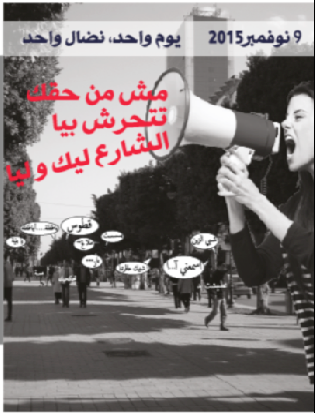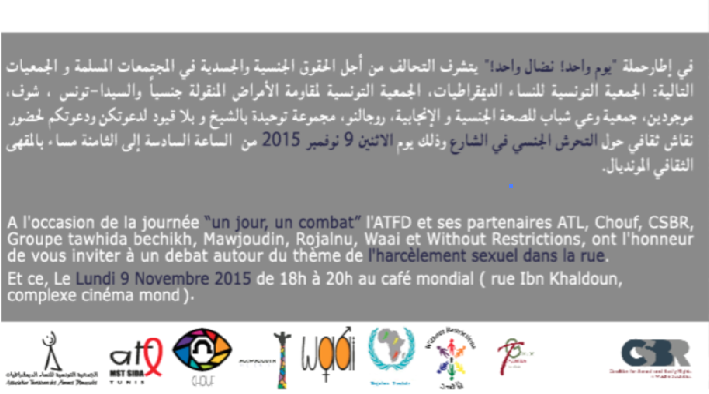
For One Day One Struggle 2015, l’Association Tunisienne des Femmes Démocrates (ATFD), in collaboration with ATL, Chouf, Groupe tawhida bechikh, Mawjoudin, Rojainu, Waii and Withour Restrictions are hosting two events looking at sexual harassment in public spaces.
Since 2004, Article 226 of the Tunisian penal code defines sexual harassment as ‘any persistence in the discomfort of others by the repetition of acts, words or gestures with the aim of bringing it to submit to his own sexual desires’, and carries a punishment including a one-year prison term and fine of up to 3000 dinars.
Yet according to civil society groups, the law that exists fails to provide effective and accessible redress and recourse to women bringing charges. Perhaps most problematically, the current law places the burden of proof on the person bringing the charge, and failure to prove that sexual harassment has occurred itself may result in fines or imprisonment for bringing a false accusation. Such a system actively discourages people from lodging a complaint for fear of reprisal, and heightens the disincentive to report for those who already feel stigma and shame from the experiences of being sexually harassed.
Another key challenge is that the law in Tunisia still narrowly focuses on sexual harassment as a phenomena limited to the workplace, completely overlooking the kinds of sexual harassment that are a daily challenge for women across Tunisia.
Sonya Ben Yahmed of ATFD shared with us the need to shift perceptions:
“Sexual harassment in public places, in the streets, is phenomenal in Tunisia. We don’t talk about it, or at least we don’t talk about it enough. It’s a huge problem here, and personally when I talk about it, people always say to me ‘Hey come on, at least we’re not in Egypt’.

Things in Egypt are have become so very challenging, of course, but being harassed in Tunisia is also totally normalized, and seen as completely banal, to the point that so many of us don’t even know how to articulate what it means to be harassed. And I’m talking about those of us who are being harassed, because the harassers know exactly what it is they are doing.
… In 2003, we’ve campaigned on the issue of sexual harassment before. We held seminars, made stickers and pamphlets, and wrote to parlement to denounce sexual harassment. And we did gather the testimonies of women’s experiences of sexual harassment, but usually this was women who have experienced sexual harassment at the workplace, and who have been fired as a result for wanting to talk about it. This was before the law was passed in 2004.
So looking at sexual harassment is not new for civil society groups in Tunisia, but [this focus on the workplace] is also why we don’t have much research or documentation to talk about sexual harassment in public spaces. We don’t have numbers, we don’t have a way to gage the issue with a lot of data, but in the last few years it is clear that it is more and more of a daily problem that women and people of different sexual orientations and gender identities are facing in the streets.
That’s why we decided to talk about this taboo topic. It is still something we cannot talk about openly, the victims still feel ashamed about it. It’s hard enough even to respond to a harasser in public space. So many times we opt to ignore it, or leave the bus or the public space, without being able to take that space to say “Stop!”, or “Hey, you just violated me” and put it in those terms.”
For ATFD, looking at all forms of violence against women, including sexual harassment in public spaces, also requires engaging men in challenging the hegemonic construction of ‘masculinity’ as inherently aggressive. “We need men to be present with us, at our events and engaging in these conversations also. We need them standing up and challenging the idea that masculinity is always aggressive, and working towards the solution. We need everyone to understand that harassment against women is a problem for all of society. And we want to raise the visibility that people of different sexual orientations and gender identities are also particularly targeted with this event.”
While a discussion and debate at a cafe in the city centre is planned for the evening, the day’s action also includes a component of going out into the streets to engage the wider community.
“For us this event is a chance have an action in a public space, either the streets or perhaps public transportation, or both. We’re not only hosting a seminar, or talking between walls, but we’re going outside to talk to people in the places where women and minorities are harassed, to take a public stand against this taboo. The idea is really to talk to people about sexual harassment, provide information on what sexual harassment is, and encourage women especially to talk about their experiences. We need new reactions to sexual harassment and new forms of engagement on the streets, and for us this event is a starting point for that.”
The #OneDayOneStruggle evening event is planned for 18h – 20h, at Cafe Mondial, Tunis. For more information about the event, see: https://www.facebook.com/Un-Jour-Un-Combat-996099703765811/

